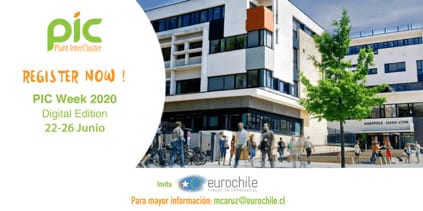Along with Eurochile, 19 companies from the country participated in the PIC Week 2020
In June of this year, 19 Chilean companies participated in the PIC Week 2020, the most important event of the plant production industry in Europe and which this year was held virtually due to the global coronavirus pandemic. Remotely, they were able to access a complete agenda of activities during the week that the PIC (Plant InterCluster) event lasted, in which it seeks to promote innovation in plant production and create a common strategy to facilitate the international development of the industry.
During those days, at the event organized by the Enterprise Europe Network (EEN) and Vegepolys Valley, among others –both with strong ties to Eurochile-, the latest European proposals related to the industry were analysed as well as the advances in the field of improvement of crops and technology, but Chilean companies were also able to access the search for technology, R&D and suitable partners for their own projects and initiatives.
“The organization of such event, with various clusters, was the opportunity to show that it is possible to set up business, technology and research conventions virtually, and make them profitable and enjoyable for companies”, says Emilien Oumehdi, commercial manager of the EEN in Auvergne Rhode Alps.
“I think the event – he adds – managed to reach an interesting number of cooperation contacts that could lead in the near future to commercial agreements. The situation of the industry is uncertain, all major countries in Europe are preparing a recovery plan for their industries with the ambition to relocate when possible strategical supply chains in Europe”.
According to Manuela Caruz, Director of Networks of Eurochile Business Foundation, among the 19 participants from Chile in the event are companies, organisations and universities with several years of work in this area, and knowledge of how to interact with foreign counterparts. For this reason, she adds, although it is still in the monitoring and information gathering stage, “there is a fair percentage of companies that found opportunities for cooperation. They always start by identifying areas of possible joint work, and then ground it down to something more specific. Now, with the pandemic, companies may need new contacts and alliances in other areas to reinvent themselves”.
In this sense, says Oumehdi, although the plant production industry has not been so affected on the continent, “Europe is seeking to make the entire industry ‘greener’, which means drastically reducing greenhouse gases and the use of pesticides, for example, to prevent most damage to the environment”.
This implies, he adds, that there are changes that will permanently affect the sector such as moving towards more sustainable transport, the use of renewable energies, the reduction of water consumption and the development of digital technologies to mitigate climate impact, among others.
For Juan Pablo Martínez, a researcher at the Agricultural Research Institute (INIA) and one of the Chilean participants in the event, the objective of participating in the PIC Week 2020 was precisely to enhance and improve the competitiveness of the food product through research and technological innovation in agriculture systems under the context of climate change and a circular economy. And along these lines, during the event they already contacted the representative of Vegepolys projects for Latin America.
Possible areas of cooperation
According to Martínez, the main areas of cooperation between INIA and Vegepolys would focus on topics such as varietal innovation in tomatoes, the development of state-of-the-art greenhouses with the concept of circular economy, and the identification of chemical attractants and native natural enemies for develop environmentally safe strategies to reduce the impact of the pest on fruit production in Chile, among others.
“The main result – adds the INIA researcher – is to visualize the applied research that is being done in France through the Vegepolys cluster, and the possibility of generating cooperation with public and private institutions in the field of research, development and innovation. The potential to scale our research with agricultural companies as is done in the French cluster”.
For Emilien Oumehdi, today the greatest possibilities for cooperation between Chile and France are mainly related to the agri-food, plant production and mountain sectors. “France has very interesting companies participating in the planning of the mountain area to value agriculture and tourism, especially in the Alps and Pyrenees”, he says.
Also, he says, national research institutes in the agricultural and plant production sector are working on the use of digital technologies to help limiting global warming effects on land/soils, to fight against known plants or new diseases and limit the use of pests that are damaging the environment. “On all these areas I believe that the cooperation between Chile and France could be very interesting and lead to win-win cooperation projects for all, both in rural and urban areas,” he says.
Today, says Manuela Caruz, “given the health and economic situation that we are experiencing as a country, Chilean companies are looking for reinventions, as well as new opportunities for collaboration in different topics and sectors.” That is why these meetings and brokerage events held within the framework of PIC Week 2020 were focused on a very specific sector such as plant production, in order for the companies and organizations that participated to seek new common strategies for a good development and promotion of this sector.
“This type of event – she added- allows them to seek new opportunities in these sectors to expand or improve their field, either in know-how or technology.” We have realised that with the current situation, these types of activities, virtual events, are becoming more necessary because the needs and priorities of companies today are different”.

